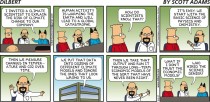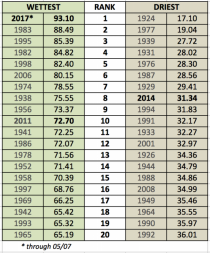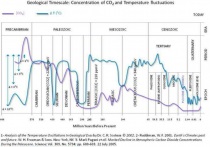FOX NEWS WASHINGTON:
NOAA REPORTS: That whole April showers thing went a bit overboard last month in the United States. The National Oceanic and Atmospheric Administration said Monday it was the second wettest April on record, averaging 3.43 inches for the nation, nearly an inch above the 20th century average. Only 1957 had more April rain. Records go back to 1895.
Only 5 percent of the U.S. is in drought, the lowest drought footprint the 17-year-old U.S. Drought Monitor has recorded. NOAA calculates that 0.75 percent of the Lower 48 states are considered “very dry.”
NOAA climate scientist Jake Crouch said many storms kept chugging over the U.S. in April from the Pacific. Crouch said April fits global warming patterns of increasing heavy downpours interspersed with drought.
End
------
ICECAP NOTE: It also fits a cooling planet as was underway from 1940 to the 1970s.... NOAA has to add the BS statement in every summary, especially after it hyped drought first in Texas and then California, some opining it was the start of ‘permadrought’. This is already the wettest/snowiest Water Year (October 1 to September 30) in the northern Sierra, beating out 1982/83.
That CO2 is amazing stuff. it freaking does it all!!!
Here is a Patriot Post story from my compadre Joe Bastardi:
Defund Climate Change Research to Pay for Pre-Existing Conditions
Joe Bastardi, Patriot Post
Here’s a novel idea.
Take the billions of dollars that’s going toward what supposedly is a settled science issue - climate change - and use it to create a pool for pre-existing conditions. It is our duty to help those less fortunate and for the government to provide a safety net. So let’s form that safety net, dealing with a known problem today, not a ghost that may or may not be there tomorrow - especially since in the age of fossil fuels human progress has skyrocketed. Do you think medicine would be where it is now without the fossil fuel era?
The rest of the nation would be in the free market for insurance, and combined with tort reform and portability, we may be able to bring the price down.
What has been the cost of fighting climate change? Check out this article in Forbes.
All that money for what? A few molecules of CO2 when the established temperature-CO2 record shows no linkage?
We can’t run from the problems of today, nor can you run from the record of the past. People are much more valuable than a few molecules of CO2.
I doubt the American people approve of billions of dollars being spent on researching whether or not the earth is flat (no offense to Kyrie Irving) or other forms of “settled science.” So for the sake of those suffering from pre-existing conditions, why don’t we take the grant money for climate change research and give it to those who really need it? If it’s “settled science,” then give up the money. You can’t have it both ways! What about investing in our inner cities, another need now? Do climate change researchers need the money more than our sick, poor and needy? I think not. I know not.
Joe Bastardi is chief forecaster at WeatherBELL Analytics, a meteorological consulting firm, and contributor to The Patriot Post on environmental issues.
------------
Note this next story is fitting in that regard. You see the same issues that are being reported on now in medicine and health have been running rampant in meteorology and climatology research. The universities and the NGOs have been milking the flowing dollars supporting the fake climate news which gets carried without question in the sympathetic fake news media.
Has Science Lost its Way?
Science’s reproducibility crisis.
For any study to have legitimacy, it must be replicated, yet only half of medical studies celebrated in newspapers hold water under serious follow-up scrutiny - and about two-thirds of the “sexiest” cutting-edge reports, including the discovery of new genes linked to obesity or mental illness, are later “disconfirmed.”
Though erring is a key part of the scientific process, this level of failure slows scientific progress, wastes time and resources and costs taxpayers excesses of $28 billion a year, writes NPR science correspondent Richard Harris.
The single greatest threat to science right now comes from within its own ranks. Last year Nature, the prestigious international science journal, published a study revealing that “More than 70% of researchers have tried and failed to reproduce another scientist’s experiments, and more than half have failed to reproduce their own experiments.”
The inability to confirm research that was published in highly respected, peer-reviewed journals suggests something is very wrong with how science is being done.
The crisis afflicts even science’s most revered ‘facts,’ as cancer researchers C. G. Begley and Lee Ellis discovered. Over an entire decade they put fifty-three published “landmark” studies to the test; they succeeded in replicating only six - that’s an 11% success rate.
A major culprit, they discovered, is that many researchers cherry-picked the results of their experiments - subconsciously or intentionally - to give the appearance of success, thereby increasing their chances of being published.
“They presented specific experiments that supported their underlying hypothesis, but that were not reflective of the entire data set,” report Begley and Ellis, adding this shocking truth: “There are no guidelines that require all data sets to be reported in a paper; often, original data are removed during the peer review and publication process.”
Another apparent culprit is that - and it’s going to surprise most of you - too many scientists are actually never taught the scientific method. As graduate students, they take oodles of courses in their chosen specialty; but their thesis advisors never sit them down and indoctrinate them on best practices. Consequently, remarks University of Wisconsin-Madison biologist Judith Kimble: “They will go off and make it worse.”
This observation seems borne out by the Nature study, whose respondents said the three top weaknesses behind science’s reproducibility crisis are: 1) selective reporting, 2) pressure to publish, and 3) low statistical power or poor analysis. In other words, scientists need to improve on practicing what they preach, which is: 1) a respect for facts - all of them, not just the ones they like, 2) integrity, and 3) a sound scientific method.
The attendees of the so-called March for Science made a lot of noise about wanting more money and respect from the public and government - what group wouldn’t want that? But nary a whisper was heard from them or the media about science’s urgent reproducibility crisis. Leaving unspoken this elephant-sized question: If we aren’t able to trust the published results of science, then what right does it have to demand more money and respect, before making noticeable strides toward better reproducibility?
Michael Guillen Ph.D., former Science Editor for ABC News, taught physics at Harvard. His novel, “The Null Prophecy,” debuts July 10.
See how Greens in Vermont discuss how a wind project destroyed the environment.







_thumb.png)
